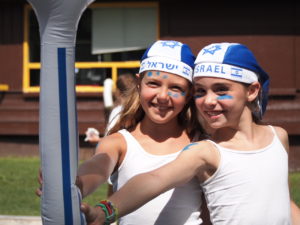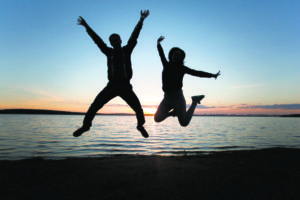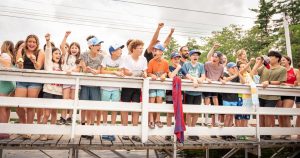The buses pull away with our precious little ones on board. We’ve carefully selected the destination, not just for dollar value, but for moral values. The kids are off to summer camp. There, in a wooded, waterfront environment, they will live Jewishly among their peers.
This summer interlude is brief, but critical. The power of the experience is borne out in statistics showing its long-term impact on matters such as keeping the faith. Camp romances blossom into marriages; friendships are forged that survive the transition into adulthood; and lifelong commitments are made, not just to people, but to being Jewish, as well. The collateral merits of Jewish camp are not just toasted at weddings, but hotly debated before, during and after the weeks in which the kids are away.
But the flip side of the coin stays pretty quiet, if not actually hush-hush. What happens behind closed doors back home? With no kids to model Jewish behaviour for, do parents maintain their own Jewish rituals? Or does making Kiddush give way to patio cocktails and barbecues?

Tamara Center and Sean Spector grew up in Montreal. They now live in Toronto, but send their daughters, Sarah and Maya, to Camp B’nai Brith of Ottawa, where Center went to camp when she was a kid. In previous summers, Center has spent her child-free evenings poring over camp photos that were posted online each day. She wondered who the girl in nearly every photo with her daughter Maya was. A little sleuthing established that it was Hannah Dym, the daughter of Mark Dym and Jennifer London, Center’s own camp friend who she had lost touch with. The two re-connected, rekindled their childhood friendship and, last month, the families travelled to each other’s hometowns to attend their respective daughters’ b’not mitzvah.
In his four years serving as the director of Camp Kadimah in Nova Scotia, Jared Goldlust saw firsthand how camp culture impacted campers and how many Kadimah alumni stay in contact well after they stop going to camp. His communications with parents has focused more on the children’s experiences than on what the parents do over the summer, but he has heard a lot about their travel plans, as parents need to inform the camp of their whereabouts, so that they can be contacted in case of an emergency. In fact, the theme of travel suffuses most of the stories parents tell about what they did while their kids were at summer camp.
An increasing number of mothers are joining women’s trips to Israel while their kids are away. Many of the parents said that they plan their trips around visiting day, to ensure that they can enjoy the magic of camp with their children for the day.
Wendy Berman and Ron Mayer sent their children – Arielle, Sam, Noa and Liam – to Camp Kadimah and enjoyed the experience of having time alone. They enhanced their trips to Nova Scotia for visitor’s day by exploring the province. Berman is the one who ensures that the family attends synagogue throughout the year. She usually derives pleasure from having her children by her side. But she has come to appreciate the tranquility of walking there with her sister and husband in the summer months.
Esther Schwartz’s four kids attended Camp Kinneret in Quebec and Camp Moshava in Ontario. She and her late husband, Markus Luft, maintained their Shabbat practice during those summers, but also went away on vacations. Early on, during a Baltic cruise, they discovered a room on the ship that was designated for Shabbat. All accoutrements were provided, down to the challah, except for someone to lead the services. But each passenger who participated was able to remember a different part of the liturgy, and together, they assembled a meaningful and memorable service.
Schwartz says that her perception of what parents do while their kids are at camp comes from something that happened before she had kids.
“My funniest camp-related memory was noticing my neighbours arrive home with a car full of flowers. I asked if they were planning to garden while the kids were away. They said they were going to cover the stove with flowers to prevent cooking all summer,” she says.
Eva and Avi Nightingale’s three kids – Michael, Jodi and Ely – began their overnight experience at Camp Shalom, in Gravenhurst, Ont., and eventually become staffers at Camp Solelim, near Sudbury, Ont.

“I remember two things about life while the kids were at camp: closing down the kitchen (the only place we’re kosher) and leaving the camp bus to drive directly to the airport for trips. Although neither of those things sound like ways to embrace our Jewishness, I must say that on our travels, we always made a point of visiting the Jewish quarter, whatever city we were in: Venice, Rome, Prague. If the destinations were less international, let’s say New York or Washington, we’d visit the Jewish museums or catch a travelling Jewish exhibit. We find that the best way to connect in another city that we are visiting is to dig up their Jewish roots,” Eva recalls.
“Ironically, our favourite summer travel memories are our many trips to Sudbury to visit Camp Solelim. As parents of staff members, we were allowed the privilege of attending the Sabbath services and watching the hevrah welcoming the Sabbath. This is the first year in over a decade that we won’t be doing that, since our kids are all done camp, and we’ll absolutely miss it.”
The Nightingales personal travel story is echoed by other Jews, according to Rabbi Debra Landsberg of Temple Emanu-El in Toronto.
“I always look forward to connecting with congregants who have spent time travelling while their children are at camp. Our conversations centre around the synagogues they visited and the Jews they encountered. It is palpable how their Jewish imagination is engaged by having experienced Shabbat with a Jewish community that is so different, yet still somehow connected to their own. I am certain that this enhances the way they engage in Jewish life with their children, who often return from camp particularly interested in exploring Jewish life,” she says.
Rabbi Landsberg often speaks of family and values from the pulpit, whether for a lifecycle event, or a holiday sermon. In addition to her duties as a rabbi, she is also the mother of triplets. From that perspective, she says that, “Personally, Adam and I have not experienced all three children away at camp at the same time – b’ezrat ha-Shem, someday we will.”
When Tania Lewis and Jonathan Center switched their daughter, Joey, and son, Lewis, from the Downtown Jewish Day School to the public school system, they wanted to put an emphasis on going to synagogue and summer camp. Their kids followed in the footsteps of their older cousins by attending Camp Northland-B’nai Brith in Haliburton, Ont. What do the parents do with their summer hiatus?
“Drink and party,” they joke. While it’s true that they can often be found sampling the many cultural events that Toronto has to offer, it’s just as likely that they’ll be enjoying a Shabbat dinner for two in their own backyard. They’re founding members of City Shul, where Jonathan Center acts as gabbai and Tania was responsible for the Shinshinim program. They uphold those obligations, regardless of whether their kids are in town.
“We light the candles and continue to make Shabbat dinner when our kids are away, but we wouldn’t go so far as to observe Tisha b’Av,” says Jonathan Center. “Wait, that’s not true,” his wife interjects. “We did observe Tisha b’Av while they were at camp, because we had an Orthodox Israeli family visiting us.”
The parents of the aforementioned older cousins at Camp Northland, Andrea and Boaz Zecharia, have a decidedly different style of dealing with Jewish traditions when their kids are gone. Do they maintain the same routine?
“Absolutely not,” says Andrea Zecharia. “All year, we do everything required to maintain a kosher home and support our kids through Jewish day school. Come summer, when it’s temporarily just the two of us, we barbecue and go out.”
Camp Northland-B’nai Brith director Simon Wolle says that, “Interestingly, an increasing trend is a lot of our camp moms are joining women’s trips to Israel. Some of the trips are themed around empowerment, others around history and some are just designed to be incredible social experiences.”
“Shabbat boycott!” was the rallying cry of Ela Ross and Ralph Crespin. They attended synagogue every Saturday with their three kids – Aviah, Aaron and Anselmo – but while the kids were at camp, they would skip services and sleep in. They actually kept Shabbat, just a bit differently.
“We still lit the candles on Friday night while the kids were away, but occasionally went out for dinner with friends, rather than staying in and doing Shabbat exactly the way we did with the kids in town,” says Ross.
A “break” from Shabbat? An alternative way of observing it? This was the refrain that came up repeatedly with the parents who spoke to The CJN. It is also something that Tamara Rebick – who has a long history of working with Jewish youths through organizations such as Hillel, United Synagogue Youth and the TanenbaumCHAT day school in Toronto – has put a lot of thought into.
“People can celebrate the idea of Shabbat in different ways: zachor, remembering, and shamor, observing. For my husband, Jon, and me, it’s about intentionality, or kavanah,” says Rebick.
Rebick shared her thoughts on the upcoming summer, which will be the first time that both her children will be away at camp. She and her husband have planned a road trip that will begin after they share Shabbat as a couple.
“Our kavanah is to continue to keep the celebration of Shabbat, which helps us remember why it’s such a sacred moment in our hectic week. To a couple with young children, nothing is more precious than an uninterrupted conversation. Being alone together is actually a throwback to our pre-kid life and what drew us together in the first place. We cherish the time alone, recognizing that it’s finite. We’ll also miss the other two who are usually at the table,” she says.
READ: FROM YONI’S DESK: ADULTS CAN’T CONTROL EVERY ASPECT OF SUMMER CAMP
The summer break from kids that camp affords parents offers paths to Jewish life that are not limited to religious observance. Jewish National Fund campaign director Rafi Yablonsky says that the best way to explore one’s Jewishness is to give back and get involved.
“Make time to volunteer. No time is too brief, no dollar amount too small. Your community needs you, and you need your community,” he says.
Yablonsky draws inspiration from his late grandfather-in-law, Holocaust survivor Bill Glied, who ended every speaking engagement with these words:
“Always stay hopeful. Whenever life gets tough, love those around you the best you can and focus on doing one good deed every day.”
These are wise words to live by – with or without kids.






